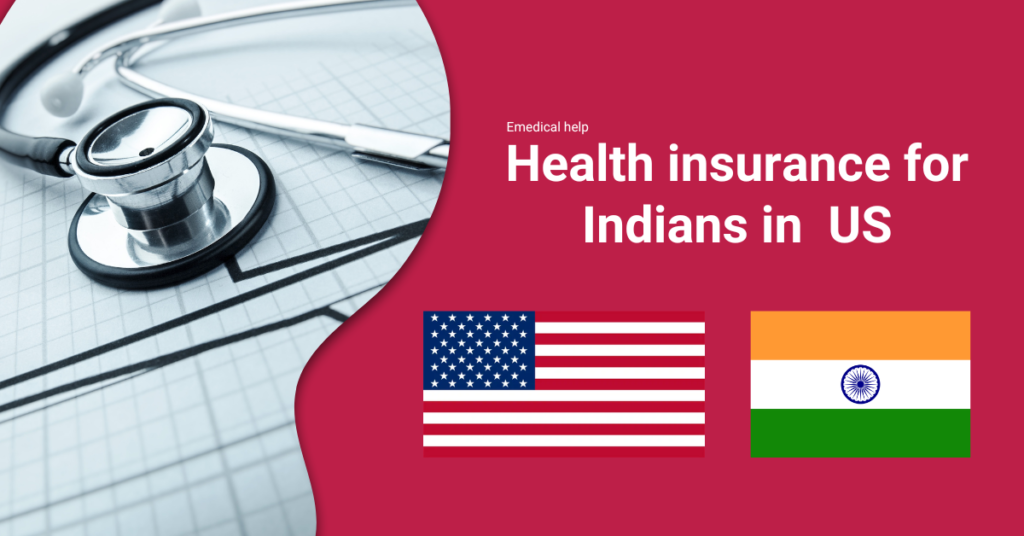Here is a guide on health insurance for Indians in the US in various situations and visa categories:

For International Students on F-1 Visa
- International students on F-1 visas are required to have health insurance that meets the minimum requirements set by their school or university.
- This typically includes coverage for medical, surgical, mental health, and prescription drug expenses.
- Some schools may also require students to have coverage for accidental injury, hospitalization, and repatriation of remains.
- It is important to carefully review the health insurance options provided by your school and compare them to other private insurance plans available in the market.
- Consider factors such as coverage limits, deductibles, copays, and out-of-pocket maximums when making your decision.
- Keep in mind that international students on F-1 visas are not eligible to enroll in Medicare or Medicaid.
For H-1B Visa Holders
- H-1B visa holders are not required to have health insurance, but it is highly recommended to have coverage in case of unexpected medical expenses.
- Some employers may offer health insurance as part of the employment benefits package, so it is worth discussing with your employer about the options available.
- If your employer does not offer health insurance, you can purchase a private insurance plan from a variety of providers in the US.
- Consider factors such as coverage limits, deductibles, copays, and out-of-pocket maximums when comparing plans.
- Keep in mind that H-1B visa holders are not eligible to enroll in Medicare or Medicaid.
For Green Card Holders
- Green card holders are eligible to enroll in Medicare and Medicaid, as well as private health insurance plans.
- Medicare is a federal health insurance program for individuals over 65 years of age or those with certain disabilities.
- Medicaid is a state-run program that provides health insurance to low-income individuals and families.
- If you are not eligible for Medicare or Medicaid, you can purchase a private health insurance plan from a variety of providers in the US.
- Consider factors such as coverage limits, deductibles, copays, and out-of-pocket maximums when comparing plans.
- Keep in mind that green card holders are required to have health insurance under the Affordable Care Act (ACA) or pay a penalty on their taxes.
For Visitors on B-2 Visa:
- Visitors on B-2 visas are not required to have health insurance, but it is highly recommended to have coverage in case of unexpected medical expenses.
- Visitors can purchase a private health insurance plan from a variety of providers in the US.
- Consider factors such as coverage limits, deductibles, copays, and out-of-pocket maximums when comparing plans.
- Keep in mind that visitors on B-2 visas are not eligible to enroll in Medicare or Medicaid.
Tips for Choosing Health Insurance in the US:
- Consider your health needs and budget when comparing insurance plans.
- Compare the premiums, deductibles, copays, and out-of-pocket maximums of different plans.
- Look for a plan with a wide network of providers, including hospitals, doctors, and specialists.
- Check if the plan covers pre-existing conditions, prescription drugs, and preventive care.
- Review the exclusions and limitations of the plan carefully.
- Consider purchasing additional coverage, such as a dental or vision plan, if needed.
Do’s and Don’t s for Indians regarding health insurance in the US
Do’s:
- Research different health insurance options and compare them carefully before making a decision. Look for a plan that fits your needs and budget, and consider factors such as the type and duration of coverage, premiums and deductibles, network of providers, and coverage for pre-existing conditions.
- Consider enrolling in a group health insurance plan through your employer, if available. These plans often offer more comprehensive coverage and lower premiums than individual plans.
- Keep track of your medical bills and receipts, and make sure to submit them to your insurance provider for reimbursement.
- Familiarize yourself with the terms and conditions of your health insurance policy, including exclusions and limitations, and contact your insurance company if you have any questions or need clarification.
- Consider purchasing additional coverage, such as a short-term health insurance plan or a travel insurance policy, to supplement your existing health insurance coverage.
Don’ts:
- Don’t wait until you get sick or injured to purchase health insurance. Most health insurance plans have a waiting period before coverage begins, and you may not be able to get coverage if you have a pre-existing condition.
- Don’t cancel your existing health insurance coverage without carefully considering the consequences. You may be subject to a penalty or be unable to get coverage again in the future.
- Don’t assume that all health insurance plans are the same. Make sure to compare the features and benefits of different plans before making a decision.
- Don’t neglect to read and understand the fine print of your health insurance policy. Make sure you know what is and isn’t covered, and contact your insurance company if you have any questions.
- Don’t forget to update your insurance company with any changes to your personal information, such as a change of address or employment, as this may affect your coverage.
